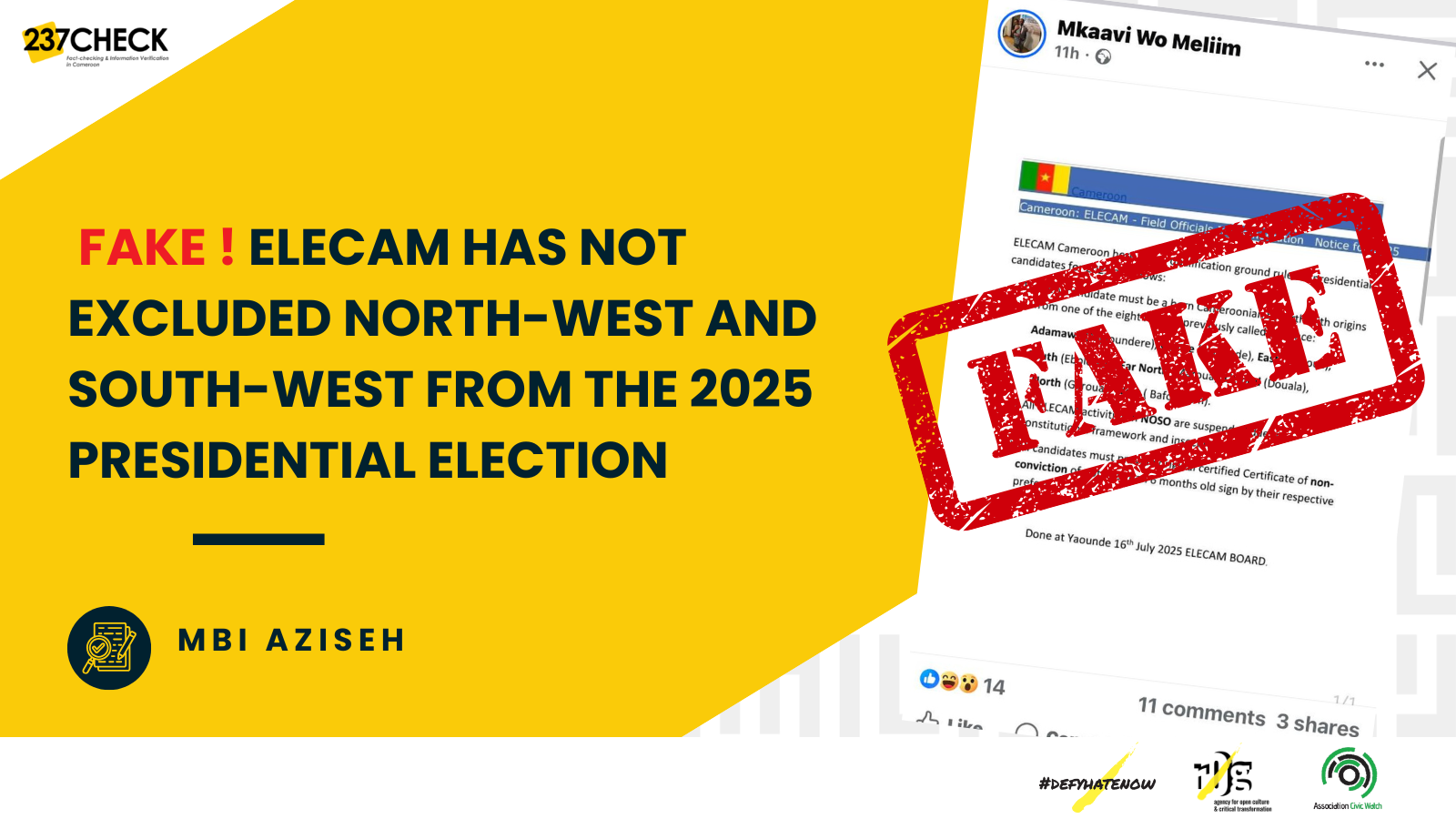By Mbi Aziseh Azimboh, 18 july 2025
A supposed statement attributed to ELECAM widely shared in community WhatsApp forum exluding the North West and South West regions is FAKE. It’s a fraudulent fabrication with the aim of misleading public opinion about the elections in the crisis-stricken English-speaking regions.
Introduction
On July 16, 2025, a pro separatist activist “Mkaavi Wo Meliim” (+12 000 followers on Facebook) shared a post which stirred controversy by claiming that Elections Cameroon (ELECAM) had issued new guidelines ahead of the 2025 presidential elections.
According to the document, only candidates from eight specific regions of Cameroon are eligible to contest the presidency, explicitly excluding the North-West and South-West regions. The document also purportedly suspends electoral activities in these two regions. This post quickly gained traction and was shared on so many WhatsApp forums of North west and south west communities.
Upon thorough verification, it becomes clear that this document is fake, misleading, and was not officially released by ELECAM.
Context
Cameroon is currently preparing for its next presidential election, which is scheduled to take place on Sunday, October 12, 2025, following the publication of Decree No. 2025/305 signed by President Paul Biya on July 11 . Once the decree is published, aspiring presidential candidates have 10 days to submit their candidacy files to ELECAM.
This election is being described by political observers as one of the most fragile and competitive in Cameroon’s political history since the pluralistic vote of 1992. Several signs point to an unusual political climate marked by growing uncertainty within the ruling elite and the opposition alike. Notably, a series of high-profile resignations of long-serving officials like Issa Tchiroma and Bello Bouba, former president ally who have decided to stand for the upcoming elections . These developments are fueling public speculation about a potential leadership transition, especially as the incumbent president, Paul Biya is 92 and is running for his 8th term.
The 2025 election is set to take place amid ongoing insecurity in the Northwest and Southwest regions, where the Anglophone crisis has displaced thousands and disrupted daily life. Armed clashes, threats to civilians, and attacks on state institutions raise serious concerns about voter turnout, safety, and the credibility of the electoral process in these conflict zones.
Verification Process
In order to verify this claim, an examination of ELECAM’s official website, verified social media accounts, and recognized press outlets yielded no trace of the new guidelines. Official documents issued by ELECAM are characterized by standardized reference numbers, specific formatting, and verified signatures none of which appear on the document circulating online. These discrepancies raise immediate questions about the document’s credibility and origin. Furthermore, The eligibility criteria for presidential candidates are clearly outlined in Sections 117, 118, and 119 of Cameroon’s Electoral Code which specify conditions to be eligible for presidential elections, such as being a Cameroonian by birth, at least 35 years old, having resided continuously in the country for 12 months, not being in a position of dependence on foreign entities, and not holding any other public elective office or professional activity.
Again, the discriminatory and unconstitutional nature of the claim further reveals its falsity. The viral post suggests that only Cameroonians from eight regions are eligible to run for president, excluding citizens from the North-West and South-West. This directly contradicts the Constitution of Cameroon and its Electoral Code, which clearly stipulate that to qualify for presidential candidacy, one must be a Cameroonian by birth, at least 35 years old, and fully enjoy civil and political rights. There is no provision within Cameroonian law that restricts presidential eligibility based on regional origin. As such, any claims suggesting otherwise are legally baseless and deliberately misleading.
Moreover, the document’s assertion that ELECAM suspended all electoral activities in the North-West and South-West due to insecurity and “constitutional review” is patently false. ELECAM continues to operate in these regions, as Joshua Osih, a presidential aspirant, deposited his candidacy file in Bamenda on July 17. Moreover, ELECAM regional offices in the Northwest and southwest region remain active, with preparations for the upcoming election. This directly contradicts the suggestion that the institution has withdrawn or paused its operations there.
Finally, the document is riddled with stylistic and grammatical inconsistencies that deviate from the formal tone and professional language typical of official ELECAM publications. Phrases such as “lay qualification ground rule” and “sign by their respective prefect” are not only grammatically incorrect but also foreign to the bureaucratic style of state communication in Cameroon. ELECAM documents, particularly those addressing national elections, are bilingual and adhere to high editorial standards. The poor wording and lack of institutional tone in the document provide further evidence that it is fake.
Conclusion
The viral post alleging that ELECAM has barred presidential candidates from the North-West and South-West and suspended electoral activities in these regions is false. The document circulated online is not an official ELECAM communiqué and contradicts both current events and established legal frameworks. In an already sensitive political climate, such disinformation threatens to distort public perception and provoke unnecessary tension.
Citizens are strongly advised to consult official sources such as ELECAM’s verified social media platforms, website, and national media outlets for credible electoral updates. As Cameroon approaches its 2025 presidential election, the spread of misinformation is likely to intensify. It is, therefore, more important than ever to verify claims before sharing, and to remain vigilant against attempts to manipulate public opinion.



